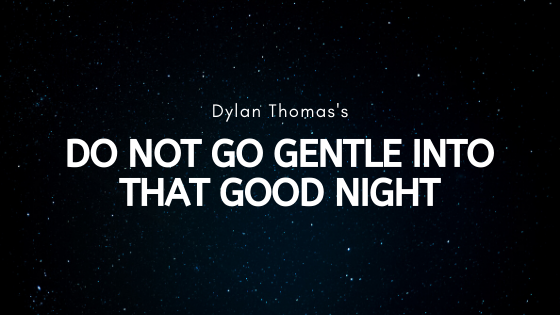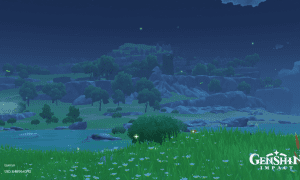Do Not Go Gentle Into That Good Night – The Poem
Do not go gentle into that good night,
Old age should burn and rave at close of day;
Rage, rage against the dying of the light.
Though wise men at their end know dark is right,
Because their words had forked no lightning they
Do not go gentle into that good night.
Good men, the last wave by, crying how bright
Their frail deeds might have danced in a green bay,
Rage, rage against the dying of the light.
Wild men who caught and sang the sun in flight,
And learn, too late, they grieve it on its way,
Do not go gentle into that good night.
Grave men, near death, who see with blinding sight
Blind eyes could blaze like meteors and be gay,
Rage, rage against the dying of the light.
And you, my father, there on the sad height,
Curse, bless, me now with your fierce tears, I pray.
Do not go gentle into that good night.
Rage, rage against the dying of the light.
by Dylan Thomas
A Short War Story
Millions of years ago on the continent of Pangea there were two major cultural dominions.
The western region was initially ruled by the greatest of the warriors. They believed in bringing unity by bringing the world under a common rule. They were too liberal wanted everyone to be able to have a say in the kingdom. This made it easy for a greedy businessman named Doma to reach the throne of Eumaxa, and he became the king. He wanted to expand his base all over the world. So he decided to move to the eastern part of the world too. His ways were a bit evil mostly guided by the profit motive at the expense of his kingdom.
In the eastern part of the world were the small counties. There were mostly self-sufficient economies not involving themselves in any international trade. There was a county called Wokansia at the eastern frontiers, ruled by a king named Sursa. He was a very pious king. Most of the revenues that were collected in the form of taxes were spent on development. There wasn’t much need and they spent a bare minimum on defense and building an army till now.
When the Doma’s army of hundreds of thousands of people reached the eastern frontiers with an aim of usurping and colonizing the eastern counties as well. They sent a message seeking an allegiance treaty from Wokansia which included surrendering a major part of the revenues to the Western kingdom in return for the employment benefits and some state benefits to the county. Sursa was invited to their base camp to sign the treaty. Failing to do so in the next two days would be deemed as an invitation to war.
Sursa called for a meeting at the senate to discuss the same. They all came to an agreement that they were not capable of entering into war with the western part of the continent. So there was no option but to sign the allegiance treaty. So Sursa along with prime minister Golchi went to the base camp on the other side of the river Thanga (on whose bank Wokansia was located).
They received quite a warm welcome there. This was supposed to be the beginning of the footprints of Eumaxa in the eastern world. While Sursa and Doma were about to sign the treaty, someone from the audience started to make fun of how petite the kingdom of Wokansia was, and they were so weak that they had no option but to bow down to the mighty kingdom of Eumaxa. To this Doma responded by shouting “ENOUGH!”. But he continued by saying “You can’t ridicule our allies, even though all that you are saying is correct”. And then he smirked looking at Sursa.
Sursa was a very calm leader and wanted peace at all cost, so he chose to ignore it. But this did not go down well with Golchi. He interrupted by saying, “I am sorry to interrupt your highness, but you can’t sign this treaty alone. According to the constitutional law of Wokansia, the queen is the equal ruler to the throne of the county and you must both sign an international treaty for it to be void.” Sursa understood in a moment that Golchi has some other plans and he is agitated at the behavior of Doma and his people. So Sursa said, “Yes, our prime minister is right. We will take this treaty transcript to our palace. Give us one day’s time we will get the Queen to sign the same and send a signed treaty to your base camp here by tomorrow evening. Failing which you can attack our county.” Doma agreed, he knew Wokansia had no option but to get it signed.
They went back, called an urgent meeting with the senate members, to discuss the same. When they told everyone how their kingdom was ridiculed at the Eumaxa’s base camp. All of them had a consensus and came to an agreement to not sign the treaty and bow down in front of the uncivilized westerners. They agreed that bowing down in front of those people will be as good as dying as they will be consciously killing their conscience. Even though they didn’t have the capacity to face the might opposition, they can still put up a firm head and at least die with pride.
So they knew that there will be an attack from Eumaxa’s army by the night after they send a message of not accepting to give the allegiance. They knew if they sent a message to other eastern counties they will understand that they need to stand together and protect the east from the west. But they will no be able to come to the rescue till the morning. So the next plan was to protect the women, children, and old people. They decided to send them to seek shelter in neighboring counties. Most women refused, they said they would stand tall in whatever little capacity they had and will add to the fleet of the army of Wokansia. Children and the elderly were sent to the neighboring counties.
As for the war, men and women together could form an army of not more than thirty-five thousand some 500 horses and less than 100 elephants. Now the best strategy was to defend themselves from the attack of bows. And they gathered the large metal household utensils because the number of shields that they had and could build overnight was much less in number. They got their swords sharpened and prepared for the war.
As expected there was an attack by the next evening. Everyone fighting knew that they were facing death, of course, they were scared like hell. At this moment came the words of wisdom and motivation from Queen Rudya. She said “Sure this is the moment of death. But if we had not chosen this route we would have lived like the dead. But now? Now we are going to make our deaths live forever. We will fight like true warriors, even if we aren’t one. Sure we don’t have the training, but we have the motive. Our opposition is fighting for a piece of land and we are fighting for our lives and our honor. And to set an example for our contemporaries in the east so that they can gather courage and provide a safer future for their younger generations, and live with pride.” Then she gave some statistics to provide a boost, “All we have to do is try and live and put up a show for as long as we can. And if possible if each individual can make 3-4 kills we might even win.”
They put in place their defense as strong as they could. Each man and woman fought as bravely as they could. Most of them died. But the surviving few could make it through till the dawn when supporting army from around 46 counties in the east arrived one by one for the rescue and outnumbered the army of Eumaxa. Eumaxa had suffered a huge loss in number. They saw at once the solidarity of the eastern counties and understood that their eastern dream wasn’t as easy as they thought.
Wokansia set an example for all the eastern counties and received the standing ovation not just from the east but also from the west. All this, just because they decided to “not go gentle into that good night. Rage, rage against the dying of the light.”
Dylan Thomas

Dylan Marlais Thomas (27 October 1914 – 9 November 1953) was a Welsh poet and writer whose works include the poems “Do not go gentle into that good night” and “And death shall have no dominion”; the ‘play for voices’ Under Milk Wood, and stories and radio broadcasts such as A Child’s Christmas in Wales and Portrait of the Artist as a Young Dog. He became widely popular in his lifetime and remained so after his premature death at the age of 39 in New York City. By then he had acquired a reputation, which he had encouraged, as a “roistering, drunken and doomed poet”. It is believed that he was a victim of substance abuse.
To read more about Dylan Thomas, click here.
Do Not Go Gentle Into That Good Night – Poem Analysis / Summary
The villanelle consists of five stanzas of three lines (tercets) followed by a single stanza of four lines (a quatrain) for a total of nineteen lines. It is structured by two repeating rhymes and two refrains.
Lately, this poem came to notice of those who aren’t even much into poetry. Thanks to Christopher Nolan’s Interstellar. The poem is used repeatedly by Michael Caine’s character Professor John Brand, as well as by several other supporting characters.
The speaker asserts that old men at the ends of their lives should resist death as strongly as they can. In fact, they should only leave this world kicking and screaming, furious that they have to die at all. At the end of the poem, we discover that the speaker has a personal stake in this issue: his own father is dying. It is believed that this poem was written by Dylan Thomas for his dying father.
To read more famous poems by the finest writers ever, click here.








Nice poem and excellent story to narrate the poem
Thank you so much. So glad you liked it.
Fascinating poem, thank you. Great!
Fascinating poem, thank you. Great! Of course, when one is involved in some frightening thing or process, they ever add to the general meaning that personal hint or scent that makes all the work of art more significant in addition, most of cases more painful. Transiency is a frightening end for all of us, to lose our beloved causes scarcely endurable suffering. But, when a poet or writer is capable of its setting forth I think, it rises his or her poem to everlasting heights. And, the story that accompanies it, thought-provoking, remindes me and evokes in me lots of layers of our history… I think it very intrigiung.